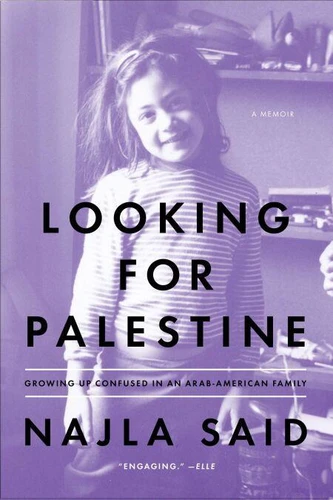Looking for Palestine. Growing Up Confused in an Arab - American Family
Par :Formats :
Disponible dans votre compte client Decitre ou Furet du Nord dès validation de votre commande. Le format ePub protégé est :
- Compatible avec une lecture sur My Vivlio (smartphone, tablette, ordinateur)
- Compatible avec une lecture sur liseuses Vivlio
- Pour les liseuses autres que Vivlio, vous devez utiliser le logiciel Adobe Digital Edition. Non compatible avec la lecture sur les liseuses Kindle, Remarkable et Sony
- Non compatible avec un achat hors France métropolitaine
 , qui est-ce ?
, qui est-ce ?Notre partenaire de plateforme de lecture numérique où vous retrouverez l'ensemble de vos ebooks gratuitement
Pour en savoir plus sur nos ebooks, consultez notre aide en ligne ici
- Nombre de pages272
- FormatePub
- ISBN978-1-101-63215-4
- EAN9781101632154
- Date de parution01/08/2013
- Protection num.Adobe DRM
- Taille699 Ko
- Infos supplémentairesepub
- ÉditeurRiverhead Books
Résumé
A frank and entertaining memoir, from the daughter of Edward Said, about growing up second-generation Arab American and struggling with that identity. The daughter of a prominent Palestinian father and a sophisticated Lebanese mother, Najla Said grew up in New York City, confused and conflicted about her cultural background and identity. Said knew that her parents identified deeply with their homelands, but growing up in a Manhattan world that was defined largely by class and conformity, she felt unsure about who she was supposed to be, and was often in denial of the differences she sensed between her family and those around her.
The fact that her father was the famous intellectual and outspoken Palestinian advocate Edward Said only made things more complicated. She may have been born a Palestinian Lebanese American, but in Said's mind she grew up first as a WASP, having been baptized Episcopalian in Boston and attending the wealthy Upper East Side girls' school Chapin, then as a teenage Jew, essentially denying her true roots, even to herself-until, ultimately, the psychological toll of all this self-hatred began to threaten her health.
As she grew older, making increased visits to Palestine and Beirut, Said's worldview shifted. The attacks on the World Trade Center, and some of the ways in which Americans responded, finally made it impossible for Said to continue to pick and choose her identity, forcing her to see herself and her passions more clearly. Today, she has become an important voice for second-generation Arab Americans nationwide.
The fact that her father was the famous intellectual and outspoken Palestinian advocate Edward Said only made things more complicated. She may have been born a Palestinian Lebanese American, but in Said's mind she grew up first as a WASP, having been baptized Episcopalian in Boston and attending the wealthy Upper East Side girls' school Chapin, then as a teenage Jew, essentially denying her true roots, even to herself-until, ultimately, the psychological toll of all this self-hatred began to threaten her health.
As she grew older, making increased visits to Palestine and Beirut, Said's worldview shifted. The attacks on the World Trade Center, and some of the ways in which Americans responded, finally made it impossible for Said to continue to pick and choose her identity, forcing her to see herself and her passions more clearly. Today, she has become an important voice for second-generation Arab Americans nationwide.
A frank and entertaining memoir, from the daughter of Edward Said, about growing up second-generation Arab American and struggling with that identity. The daughter of a prominent Palestinian father and a sophisticated Lebanese mother, Najla Said grew up in New York City, confused and conflicted about her cultural background and identity. Said knew that her parents identified deeply with their homelands, but growing up in a Manhattan world that was defined largely by class and conformity, she felt unsure about who she was supposed to be, and was often in denial of the differences she sensed between her family and those around her.
The fact that her father was the famous intellectual and outspoken Palestinian advocate Edward Said only made things more complicated. She may have been born a Palestinian Lebanese American, but in Said's mind she grew up first as a WASP, having been baptized Episcopalian in Boston and attending the wealthy Upper East Side girls' school Chapin, then as a teenage Jew, essentially denying her true roots, even to herself-until, ultimately, the psychological toll of all this self-hatred began to threaten her health.
As she grew older, making increased visits to Palestine and Beirut, Said's worldview shifted. The attacks on the World Trade Center, and some of the ways in which Americans responded, finally made it impossible for Said to continue to pick and choose her identity, forcing her to see herself and her passions more clearly. Today, she has become an important voice for second-generation Arab Americans nationwide.
The fact that her father was the famous intellectual and outspoken Palestinian advocate Edward Said only made things more complicated. She may have been born a Palestinian Lebanese American, but in Said's mind she grew up first as a WASP, having been baptized Episcopalian in Boston and attending the wealthy Upper East Side girls' school Chapin, then as a teenage Jew, essentially denying her true roots, even to herself-until, ultimately, the psychological toll of all this self-hatred began to threaten her health.
As she grew older, making increased visits to Palestine and Beirut, Said's worldview shifted. The attacks on the World Trade Center, and some of the ways in which Americans responded, finally made it impossible for Said to continue to pick and choose her identity, forcing her to see herself and her passions more clearly. Today, she has become an important voice for second-generation Arab Americans nationwide.



